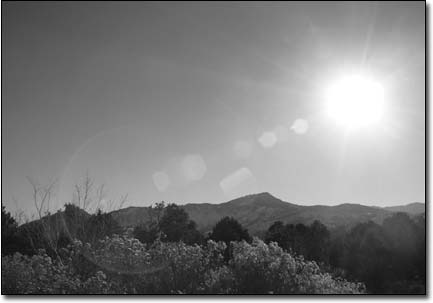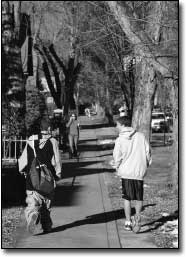|
Scientists say our love of hydrocarbons is sending us into uncharted territory

|
|
The midday December sun shines brightly in an otherwise empty sky over Durango. Given current burning of fossil fuels, carbon concentrations at the end of this century are expected to be the highest in at least 20 million years, resulting in a net temperature gain anywhere from 3.1 to 8.9 degrees. Such an increase could spell shorter winters, less snow and somewhat dramatic climatic shifts for Colorado's mountain towns./Photo by Todd Newcomer.
|
Editors note: The following is the first in a series by Allen Best, "Danger in Degrees," which takes a look at global warming and the economic and environmental ramifications it has for the Western United States and beyond. by Allen Best Hiking along the Continental Divide north of Georgetown three years ago, Ed Knapp noticed something awry. Several feet below the lip of a withering field of ice and snow was a skull with down-turning horns - a bison skull. Bison skulls in the mountains are common enough, although none had ever been found quite so high, at nearly 13,000 feet in elevation. However, the bigger surprise was the rapid retreat of ice. When Knapp began hiking the Continental Divide in the 1970s, the permanent snowfield had been 200 yards long. A year after it yielded the skull, it vanished altogether. Make no mistake, the climate is shifting, here and across the world. Since record-taking began more than 100 years ago, the 10 warmest years have occurred since 1983. Mountain glaciers have been reduced by about half. Sea levels are up 6 to 10 inches. In Colorado's mountains, evidence of warming is found at every turn. Winter nights are warmer, the frost-free season longer, and spring runoff earlier. Susan Salomon, a scientist from Boulder renowned for her work during the 1980s in documenting the widening ozone hole over Antarctica, warns against construing too much from local or even regional weather. "Climate varies in your back yard much more than it does in the global mean," she says. "We have to be very careful in trying to attribute local variations to global warming." That said, she and most other climate scientists agree that human-caused global warming, if it hasn't already begun, is on the way. The climate is always shifting, sometimes slowly but other times rapidly, as a result of natural processes. What is new is the enormous burning of coal, petroleum and other fossil fuels that are producing greenhouse gases unprecedented in at least 740,000 years. Global atmospheric concentrations of carbon dioxide, the most common greenhouse gas, rose 20 percent during the 20th century. "It's almost impossible to find a scientific researcher who doubts the connection between people and greenhouse warming, and that we're in for an unprecedented warming during the next 100 years," says John Harte, a professor at the University of California at Berkeley. Yet, critics remain. The theory is unproven, they say. But Harte points out that until relatively recently, some researchers - those on the payroll of tobacco companies - disputed links between cigarettes and cancer. "That's exactly what's going on in the global warming debate," he argues. However, even those scientists convinced of global warming admit to uncertainties. Climate change is enormously complicated. The slight wobble in the Earth's orbit around the Sun causes shifts from swamps to glaciers. Drifting continents also provoke climatic shifts. Still puzzling is the constant redistribution of carbon among plants, the ocean and the atmosphere. The role of clouds also baffles scientists. Still, given our current burning of fossil fuels, carbon concentrations at the end of this century are expected to be highest in at least 20 million years - long before people were on the planet. Century's top issue That makes climate change the paramount issue for the 21st century. Yet it is unlike most environmental problems, which have local causes and local solutions. Air in the atmosphere mixes rapidly. Pollution from Denver hit Washington, D.C., in a few days; Athens in about a week; and Tokyo a few days later. Over time, air in one hemisphere thoroughly mixes with another. Within two years, the global atmosphere becomes one big punch bowl. Unlike many conventional environmental problems, greenhouse gases have a cumulative effective and lag time. Global warming in 2030 will be the result of pollution that year, but also this year - and the year of your birth, the year of your mother's birth, and even the year that Beethoven was born.

|
|
Two boys make their way down a Durango sidewalk on a recent warm afternoon. Researchers believe we are heading toward another ice age, the arrival of which may have been delayed by greenhouse gas emissions./Photo by Todd Newcomer.
|
Unlike many conventional environmental problems, greenhouse gases have a cumulative effective and lag time. Global warming in 2030 will be the result of pollution that year, but also this year - and the year of your birth, the year of your mother's birth, and even the year that Beethoven was born. "The problem we are creating has a 10,000-year effect," says Duane R. Kitzis, a scientist with the National Oceanic and Atmospheric Administration in Boulder. Two other scientists from Boulder, Thomas Karl and Kevin Trenbert, report a 90 percent probability that global temperatures will rise anywhere from 3.1 degrees to 8.9 degrees Fahrenheit between the years 1990 and 2100. If change is minimal, Aspen could get a climate more like that of Salida. The high end would yield a climate more like that of Glenwood Springs, which in turn could become more like Grand Junction. Chilly Dillon, in turn, could become more like Aspen, and Leadville more like Vail. Vail could become as warm - and perhaps as dry - as the foothills outside of Denver. Overdue for ice age Already, what we consider "normal" is very unusual, as new research has made clear. "It's worth noting that in the past 430,000 years, the percentage of time that climate was as warm as it is today is quite small, about 5 to 10 percent, and before that time, it appears to never have been that warm," writes James W. C. White in the June 11 issue of Science magazine. "Our current climate appears to be a rarity, if not an anomaly." While most lulls between glacial advances have lasted 4,000 to 6,000 years, our current lull has lasted 12,000 years, points out White. It's possible our civilization has advanced this far because of this unusual climate stability. Anthropologists say we're not smarter than Neanderthal man, just luckier. We drew the climatic breaks. But major changes have occurred even during this climatic calm. From such things as tree rings and pollen in the soil, paleoclimatologists have concluded that treeline on Mount Evans, the 14,000-foot peak south of Idaho Springs, once was nearly 2,000 feet higher, and another time nearly 1,000 feet lower. The general drift has been back toward ice. Radiocarbon tests show the bison calf at Jones Pass, north of Georgetown, died at around 1560, near the beginning of a cooling interlude called the Little Ice Age - some 300 years of slightly expanding glaciers and permanent snowfields. Some scientists even wonder whether the additional4 greenhouse gases for the last 6,000 years that resulted from biomass burning and more methane from the growing of rice has kept the next ice age at bay. Washing machine on spin Even if this is so, it's a gamble. We don't know the consequences of adding so many greenhouse gases to the atmosphere, say scientists. Furthermore, scientists generally have little faith that technology answers can be devised. Instead, most think the task is to lessen our reliance upon fossil fuels, the primary source of those gases, even as the world's population swells. "It's not an emergency in the sense that if we don't do anything this year, we die next year," notes Randy Udall, a Carbondale-based writer who has spent a decade learning about climatic change. "The climate scientists like to say that 'one year's emissions don't matter that much.' That is because the cumulative total will control the extent of the warming. "But it is an emergency in the sense of the magnitude of the change in energy systems required. In that sense, there's no time to waste." ☯
|